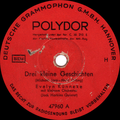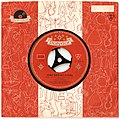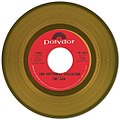Polydor
Polydor ( LC 00309) is the name of a German music label that today belongs to the major label Universal Music of the Vivendi media company .
history
Established as an export label
The German Grammophon AG was allowed because of the Treaty of Versailles outside the German Reich her trademark voice of his master , and the name gramophone no longer use. In Europe, the Gramophone Company kept the trademark rights in Hayes, UK . Company boss Emil Berliner sold America rights in 1924 to the Victor Talking Machine Company . In the same year, Deutsche Grammophon AG therefore founded the Polydor brand as an additional label for export . The name was created from the Greek (πολύς polýs "much" and δῶρον dōron "gift") - many gifts . Well-known dance orchestras of the 1920s and early 1930s with this label were Arthur Briggs , Oskar Joost , Ilja Livschakoff and above all Paul Godwin , well-known interpreters including Max Hansen , Lilian Harvey , Johannes Heesters , Theo Lingen , Otto Reutter and Claire Waldoff .
Shellac record of an aria from Die Walküre (Du bist der Lenz) ( Richard Wagner ), sung by Frida Leider and Lauritz Melchior , 1924
Shellac record from the 5th Symphony ( Ludwig van Beethoven ), played by the Berliner Philharmoniker (conductor: Wilhelm Furtwängler ), 1929
Second World War
In 1941 Siemens & Halske AG took over Deutsche Grammophon. The shellac records then appeared temporarily under the Siemens-Polydor label . Until production was largely stopped due to a lack of material around 1943, some high-quality pressings were made by Hans Georg Schütz , Friedrich Schröder , Willi Stech and Mimi Thoma, among others . Since the Polydor records were still intended for export, Swing titles were also released .
post war period
The Deutsche Grammophon pressing works in Berlin-Tempelhof survived the Second World War largely unscathed. Production was resumed as early as 1946. From then on, the company published almost all recordings of dance and light music under the different colored Polydor labels. In 1949 the uniform red star logo was introduced. The first hit of the post-war period was the song Capri-Fischer , interpreted by Magda Hain in 1943 , which was also recorded by Rudi Schuricke for Siemens-Polydor in the same year, but was only successfully published in its version after the end of the war. Other successful interpreters in the first half of the 1950s included Lale Andersen , Bully Buhlan , Renée Franke , Friedel Hensch and the Cyprys , Evelyn Künneke , Bruce Low , Liselotte Malkowsky , Werner Müller , Jupp Schmitz , Gerhard Wendland and Helmut Zacharias , as well René Carol with the hit red roses, red lips, red wine (first gold record after the war; 1953).
Shellac record Three Little Stories , sung by Evelyn Künneke , 1946
Shellac record Am Lago di Garda , sung by Rudi Schuricke , 1951
From 1953, the labels with the orange star logo appeared. In 1955 Polydor released individual records in their own covers . The music producer in the studios Hamburg, Cologne and Vienna provided with Peter Alexander , Caterina Valente , Freddy Quinn , Max Greger , Margot Eskens or Lolita numerous successful artists who met exactly the tastes and led the German hit parade. They were particularly successful with operetta recordings. In the 1950s and 1960s, the conductor Franz Marszalek produced a series of operetta cross-sections and so-called composer pictures, which were sold millions of times. When rock 'n' roll became popular in the second half of the decade , Studio Vienna in particular made a name for itself under producer Gerhard Mendelson with cover versions of US hits. Peter Kraus and Ted Herold became the most successful German interpreters of this music genre.
Single Manhattan Boogie , sung by Lonny Kellner and Günter Schnittjer with the orchestras Helmut Zacharias and Michael Jary , 1953
Shellac record The moon keeps its watch , sung by Peter Alexander , 1955
Shellac record Heimweh , sung by Freddy Quinn , 1956
Single B.-R. Boogie , played by Max Greger and his orchestra, 1957
Single Nel blu dipinto di blu , sung by Domenico Modugno , 1958
Single Susie Darlin ' sung by Tommy Kent in 1958
Single Uncle Satchmo's Lullaby , sung by Louis Armstrong and Gabriele , 1959
Single Venus sung by Frankie Avalon in 1959
1960s
Bill Ramsey , Gus Backus , the Hazy Osterwald Sextet and Bert Kaempfert's orchestra were among the popular Polydor stars of the early 1960s. In 1963 the red logo, which is still used today, was introduced. As more and more English beat titles pushed their way into the German hit lists towards the middle of the decade , sales of German-language music fell significantly. The Polydor also initially had difficulties adapting to the new taste. Indeed, with Roy Black , Karel Gott , Renate Kern , Chris Roberts or Wencke Myhre one could also establish successful pop interpreters. The repertoire was expanded towards the end of the decade with international performers such as the Bee Gees , Jimi Hendrix , The Who or the German protest singer Franz Josef Degenhardt . The most successful LPs now came from James Last .
Single Va Bene , sung by Peter Kraus ( stereo version), 1960
Single My Bonnie sung by Tony Sheridan & The Beat Brothers , 1961
Single Moon Over Naples (Spanish Eyes) , played by Bert Kaempfert and his orchestra, 1965
Single All in White , sung by Roy Black , 1965
Single Hey Joe from Jimi Hendrix Experience , 1966
Single do you know where (Schiwago melody) , sung by Karel Gott , 1967
Music album Unicorn by Tyrannosaurus Rex , 1969
Music album Blind Faith by Blind Faith , 1969
1970s until today
In the 1970s, Polydor, which has been part of Polygram since 1972 , released records by well-known national and international stars, including Barry Ryan , Neil Sedaka , Daliah Lavi , James Brown , Plácido Domingo , Konstantin Wecker , Ougenweide , Georg Danzer and Barclay James Harvest , Slade and ABBA . Hits by Volker Lechtenbrink , Hubert Kah , Rolf Zuckowski , Haindling , Level 42 and Patricia Kaas followed in the 1980s . Also was Cyndi Lauper and her band Blue Angel with Polydor under contract before they stormed the charts solo. Polydor's chart successes in the 1990s came from Matthias Reim , Rosenstolz , Ronan Keating , Andrea Bocelli and André Rieu , among others . In 1998 Seagram acquired PolyGram and combined it with Universal Music . In 2000, the French conglomerate Vivendi merged with Seagram to create the world's second largest music group Vivendi Universal , headquartered in France. On April 20, 2006, the shareholders decided to change the company's name back to Vivendi . The Polydor label is still present today as its record label.
Single Butterfly Collector by The Jam on yellow vinyl (American pressing), 1979
Music album Super Trouper by ABBA , 1980
Accessories, record players and music cabinets
Polydor also sold accessories through specialist dealers, especially devices for cleaning plates. Record players and music cabinets were also sold under the Polydor brand for several years.
German number one hits by Polydor (1951 to 1990)
Since an official hit parade in Germany has only existed since 1959 and the company Polydor has only saved data since 1975, the number 1 hits of the years 1951–58 are only determined on the basis of record sales figures that were mentioned in press reports.
- Lale Andersen - Blue Night at the Harbor (1951)
- Renée Franke & Detlev Lais - A white wedding carriage (1952)
- Friedel Hensch and the Cyprys - Tango-Max (1952)
- René Carol - Red Roses, Red Lips, Red Wine (1953)
- Gerhard Wendland - Jambalaya (1953)
- Bully Buhlan - I want to dance at your wedding (1954)
- Peter Alexander - The Moon Keeps Its Watch (1955)
- Caterina Valente & Peter Alexander - Possibly (1956)
- Margot Eskens - Tiritomba (1956)
- Club Indonesia - Get into the dream boat of love (1956)
- Freddy Quinn - Homesickness (1956)
- Freddy Quinn - Rosalie (1956)
- The Seven Ravens - Smoky (1956)
- Club Argentina - Oh Billy Boy (1957)
- Peter Alexander - I know what's wrong with you (1957)
- Margot Eskens - Cindy, Oh Cindy (1957)
- Freddy Quinn - Homeless (1957)
- Caterina Valente - Where My Sun Shines (1957)
- Freddy Quinn - The Legionnaire (1958)
- Peter Kraus - Hula Baby (1958)
- Freddy Quinn - I'll Be Back Soon (1958)
- Freddy Quinn - The Guitar and the Sea (1959)
- Bill Ramsey - Souvenirs (1959)
- Freddy Quinn - Under Strange Stars (1959)
- Ted Herold - Moonlight (1960)
- Ivo Robić - Life only begins at 17 (1961)
- Bill Ramsey - Pigalle (1961)
- Freddy Quinn - La Paloma (1961)
- Gus Backus - The Man in the Moon (1961)
- Mina Hot Sands (1962)
- Peter Kraus - Sweety (1962)
- Freddy Quinn - Boy Come Back Soon (1962)
- The Tahiti Tamourés - Wini-Wini (1963)
- Roy Black - All in White (1965)
- Freddy Quinn - One Hundred Men and One Command (1966)
- Roy Black - All White (1966)
- Roy Black - Good Night My Love (1967)
- Roy Black - My Love for You (1967)
- Bee Gees - Massachusetts (1967)
- Bee Gees - World (1968)
- Roy Black - Stay With Me (1968)
- Bee Gees - Words (1968)
- Roy Black - The Girl Carina (1969)
- Roy Black - Your Most Beautiful Gift (1969)
- Miguel Ríos - A Song of Joy (1970)
- Bata Illic - Michaela (1972)
- ABBA - Waterloo (1974)
- The Rubettes - Sugar Baby Love (1974)
- ABBA - SOS (1975)
- ABBA - Mamma Mia (1975)
- ABBA - Fernando (1976)
- ABBA - Dancing Queen (1976)
- ABBA - Money, Money, Money (1976)
- ABBA - Knowing Me, Knowing You (1977)
- Jeanette - Porque te vas (1977)
- Oliver Onions - Santa Maria (1980)
- ABBA - Super Trouper (1980)
- Visage - Fade to Gray (1981)
- ABBA - One of Us (1981)
- Robin Gibb - Juliet (1983)
- Nino de Angelo - Beyond Eden (1984)
- Opus - Live Is Life (1985)
- Level 42 - Lessons in Love (1986)
- Fat Boys & Chubby Checker - The Twist (1988)
- Koreana - Hand in Hand (1988)
- Matthias Reim - Damn, I Love You (1990)
Music albums (selection)
- Caterine Valente: The Hi-Fi Nightingale (1956)
- Caterina Valente: Plenty Valente! (1957)
- Franz Josef Degenhardt : Don't Play with the Dirty Children (1965)
- Hans Moser and Paul Hörbiger : Servus Wien (1965)
- The Monks : Black Monk Time (1966)
- Roy Black : Roy Black (1966)
- Wencke Myhre : Wencke Myhre (1966)
- The Who : My Generation (1966)
- The Who: A Quick One (1966)
- The Who: The Who Sell Out (1967)
- Bee Gees: Odessa (1969)
- The Who: Tommy (1969)
- Derek and the Dominos : Layla and Other Assorted Love Songs (1970)
- The Who: Who's Next (1971)
- Slade: Slade Alive (1972)
- ABBA: Ring Ring (1973)
- Ougenweide : Ougenweide (1973)
- The Who: Quadrophenia (1973)
- ABBA: Waterloo (1974)
- Ougenweide: All That Because I Like (1974)
- ABBA: ABBA (1975)
- Keith Moon : Two Sides of the Moon (1975)
- The Who: The Who by Numbers (1975)
- ABBA: Arrival (1976)
- Ougenweide: Feast for the ears (1976)
- ABBA - The Album (1977)
- Franz Josef Degenhardt: Suede Coat Man (1977)
- Barclay James Harvest : Gone to Earth (1977)
- The Who: Who Are You (1978)
- ABBA: Voulez-Vous (1979)
- ABBA: Super Trouper (1980)
- ABBA: The Visitors (1981)
- Georg Danzer : Calm Before the Storm (1981)
- The Who: Face Dances (1981)
- The Who: It's Hard (1983)
- Udo Lindenberg: Odyssey (1983)
- Deep Purple : Perfect Strangers (album) (1984)
- John Lennon and Yoko Ono : Milk and Honey (1984)
- ABBA: ABBA Live (1986)
- Deep Purple: The House of Blue Light (1987)
- Howard Carpendale: Up Close (1991)
- Udo Lindenberg: Gustav - 10 Keys to the Hotel Imperial (1991)
- Carpenters: Their Greatest Hits (1993)
- Andrea Bocelli : Bocelli (1995)
- Andrea Bocelli: Viaggio Italiano (1996)
- Rosenstolz : Sugar (1999)
- Rosenstolz: Cash poison (2000)
- Nerina Pallot : Dear Frustrated Superstar (2001)
- Bro'Sis : Never Forget (Where You Come From) (2002)
- Jeanette Biedermann : Rock My Life (2002)
- Rosenstolz: Make love (2002)
- Bro'Sis: Days of Our Lives (2003)
- No Angels : Pure (2003)
- Bro'Sis: Showtime (album) (2004)
- Girls Aloud : What Will the Neighbors Say? (2004)
- Take That : Beautiful World (2006)
- Bright Eyes : Cassadaga (2007)
- Stefanie Heinzmann : Master Plan (2008)
- Take That: The Circus (2008)
- Take That: Progress (2010)
- Sarah Connor : Mother tongue (2015)
- Sarah Connor: Heart Power Works (2019)
literature
- Bettina Greve: Starry Sky. The chronicle of a German record brand. Hannibal 2001. 263 pages. ISBN 978-3854452058
- Manfred Günther and Günter Lotz: a name like music. The Polydor Singles Germany 1953-1970. Bear Family Records 2001. 302 pages. ISBN 978-3-89795-821-0



























